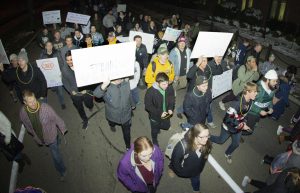Out of the dark and into the light, students Take Back the Night
October 30, 2019

Students on Algoma Blvd. take back the night and bring awareness to sexual assault and domestic violence.
Take Back the Night aims to raise awareness about the problem of sexual violence as well as offer support to people who have been victimized. This year, Take Back the Night took place Oct. 29.
“Take Back the night is meant to empower communities to take a stand against sexual assault and domestic violence,” UW Oshkosh Health Promotion intern Jennifer Brenner said. “It is also an event to bring awareness and provide resources no matter what one may define their gender or sexuality.”
The event begins with a resource fair, followed by a program on missing and murdered indigenous women, a march through campus and an art gallery on the third floor of Reeve Union.
Brenner said the goal of Take Back the Night is to spread awareness about sexual violence and to ultimately end sexual and domestic violence.
“This event is not only for survivors, but also allies,” Brenner said. “Sexual assault and domestic violence affects everyone regardless of race, gender or sexuality.”
UWO staff counselor Leslie Wartgow said this event helps portray the reality of sexual and domestic violence.
“We want to show how difficult it is for all survivors, but especially under-represented populations and the barriers they may face,” Wartgow said. “We want students to know the resources that are available to them on campus, as well as the community, and to provide support to survivors as a whole.”
Wartgow said it’s important for people to believe survivors and show support where it’s needed.
“Statistics tell us that one in six female-identified students, one in sixteen male-identified students and one in three Native American female-identified survivors will experience some form of sexual assault in their college career,” Wartgow said. “We also know that female-identified students of color are not well represented in the statistics as they do not report as often as white female-identified students, but they are statistically sexually assaulted at a higher rate.”
According to the Rape, Abuse & Incest National Network website, 21% of transgender, genderqueer and nonconforming college students have been sexually assaulted, compared to 18% of non-TGQN females and 4% of non-TGQN males.
“This event is trying to show the ongoing need for support of all survivors as well as highlight the challenges of under-represented populations of survivors,” Wartgow said.
Brenner said since sexual assault and domestic violence are so prevalent, it is important to provide resources for survivors and people who may know a survivor.
“It is beneficial because some people may not be certain of what constitutes sexual assault, domestic violence or appropriate boundaries — it can really vary from case-to-case,” Brenner said. “It also allows survivors to know that they aren’t alone and that people are there to support them.”
Campus for Awareness and Relationship Education director Emily Mueller said this is the 29th annual Take Back the Night event on the UWO campus.
“Everyone should participate,” Mueller said. “It is a great event to attend whether it is something you are passionate about and want to raise more awareness or if you want to learn more about how to get involved.”
Wartgow said the march is one night not to be silent. Make your voices heard.
“We encourage students to continue supporting and standing against violence of any form all throughout the year,” Wartgow said. “They can do that by getting involved with the Center for Diversity and Inclusive Excellence programs, joining student organizations that support survivors and educate the campus on bystander intervention, becoming a Peer Wellness Educator, attending events that educate about how to be a good ally to a survivor and signing up for a bystander intervention training.”













